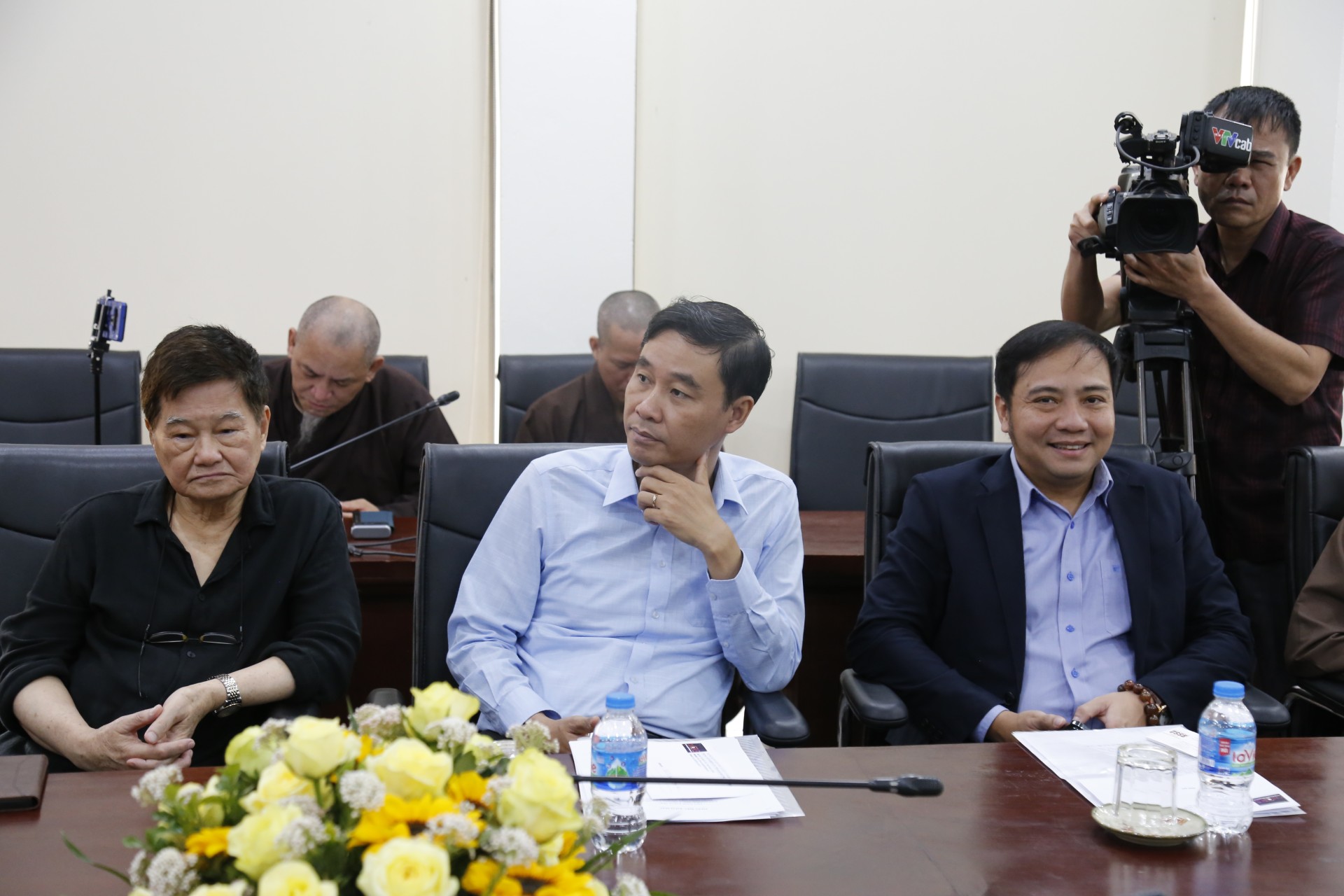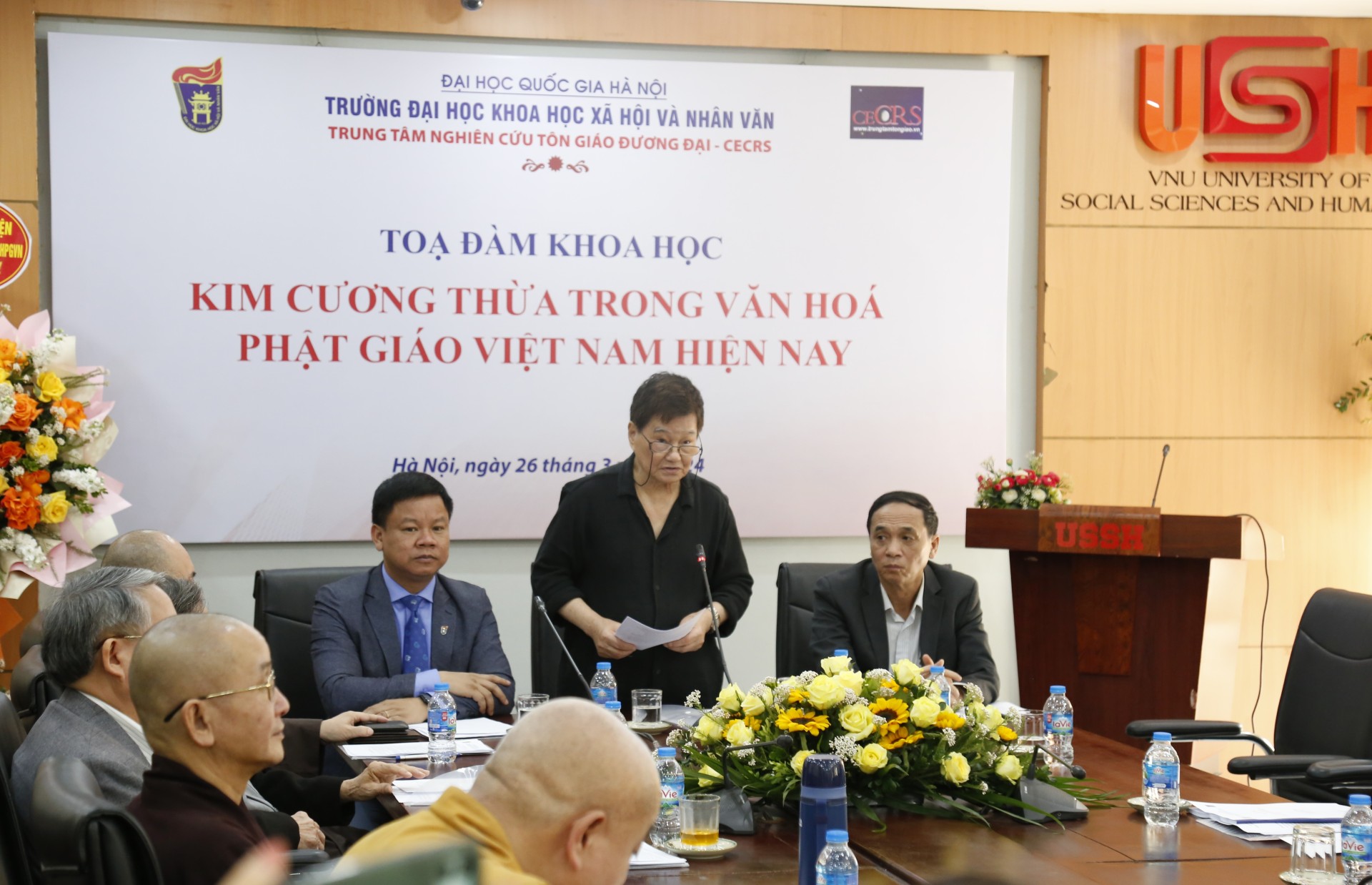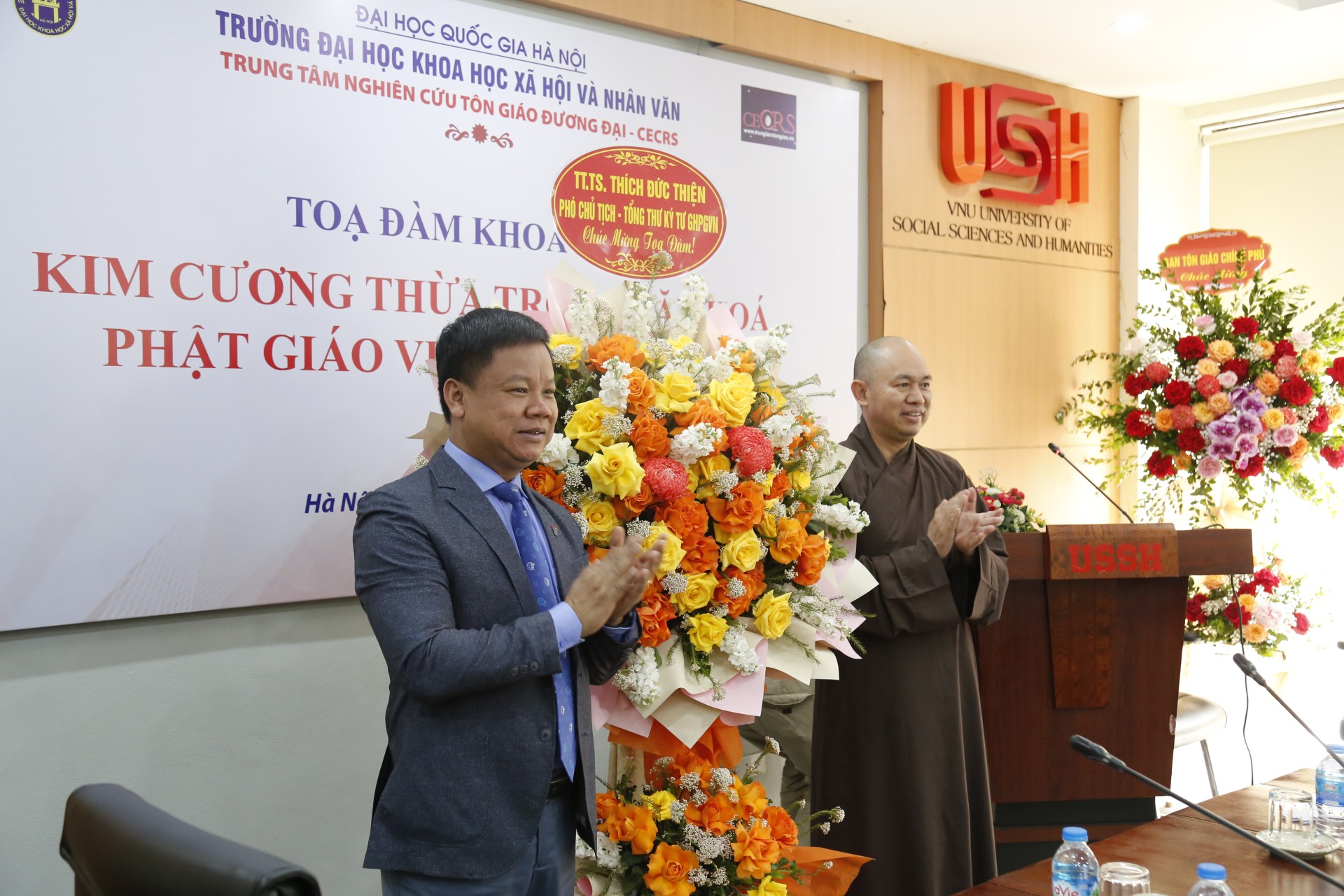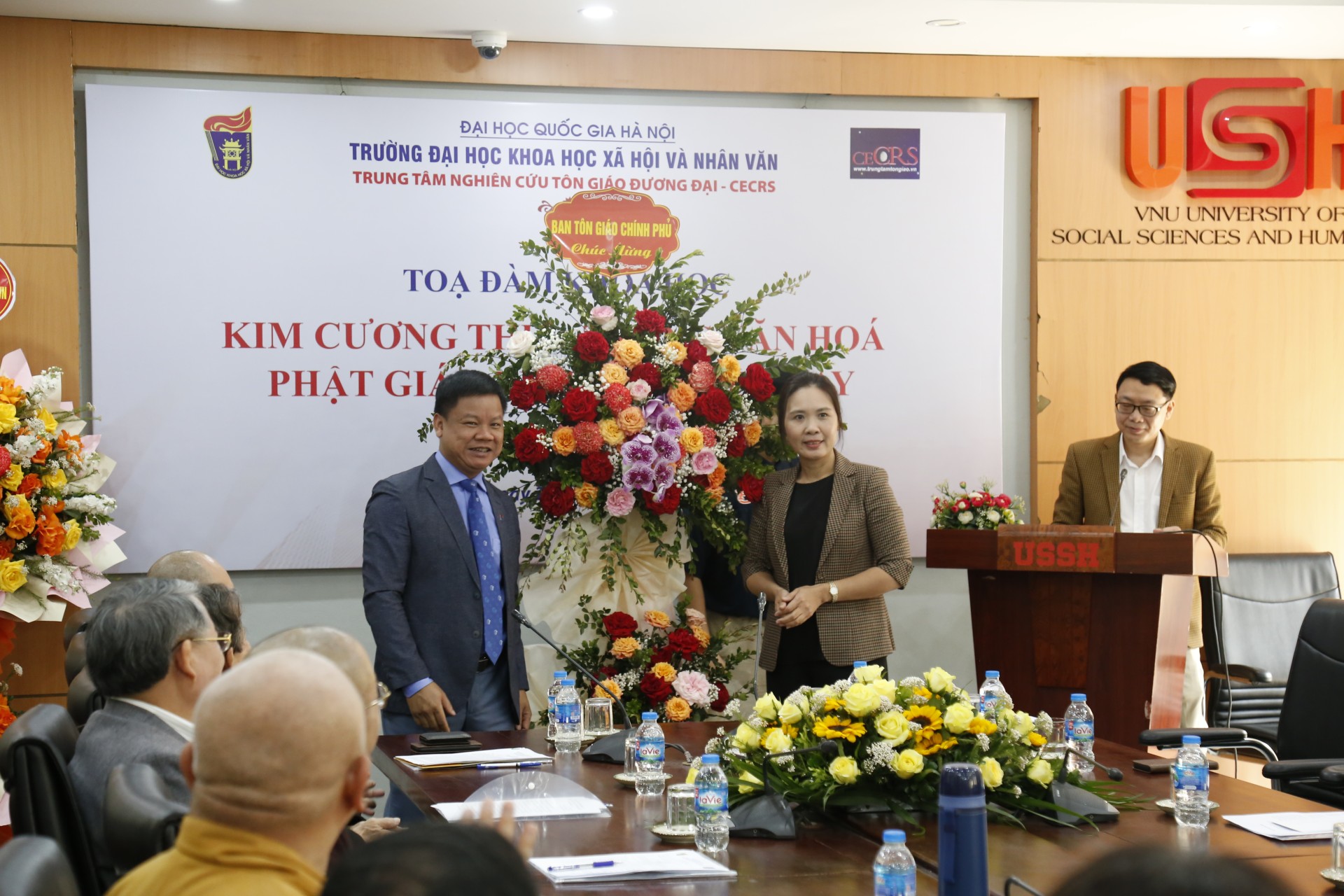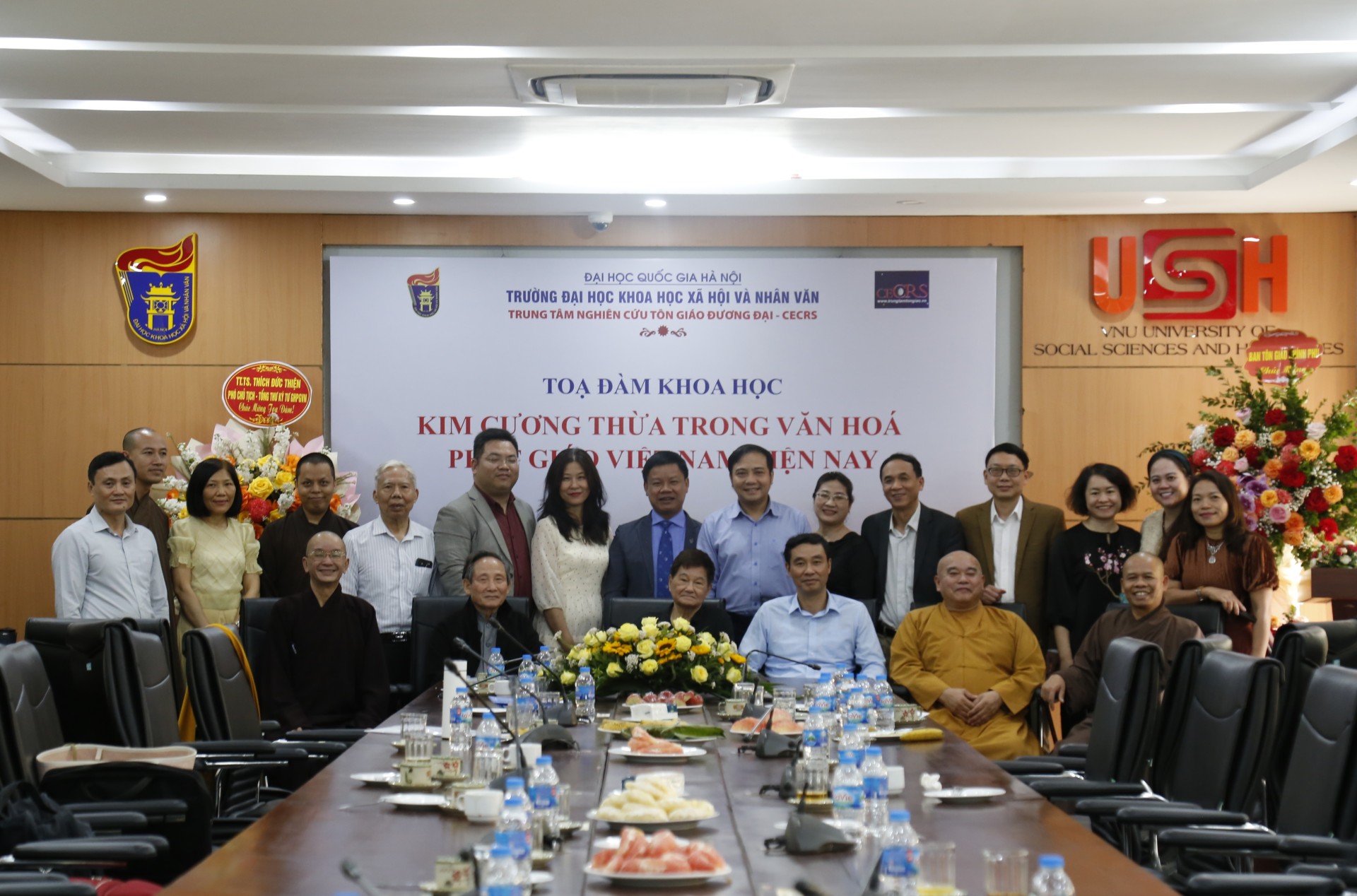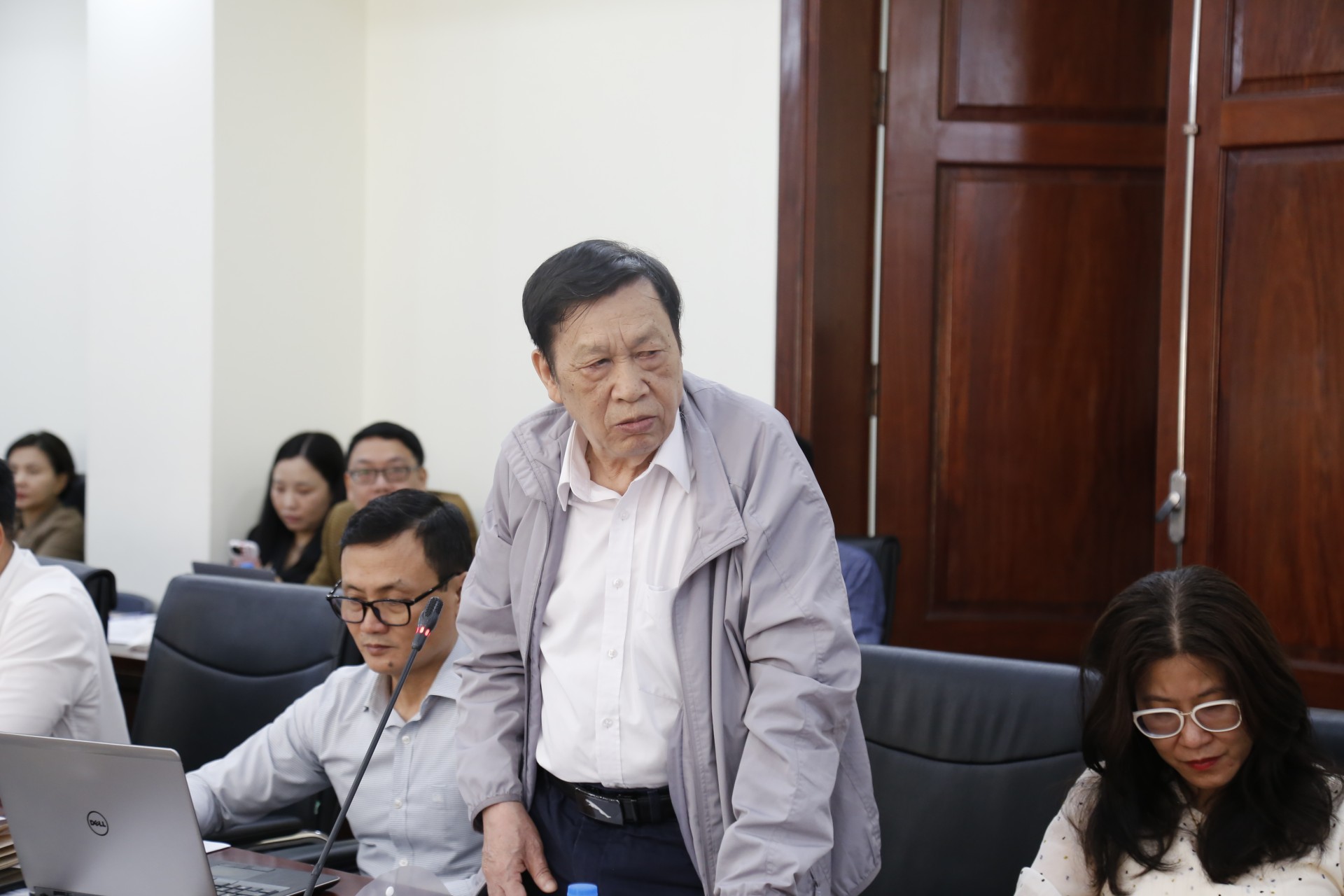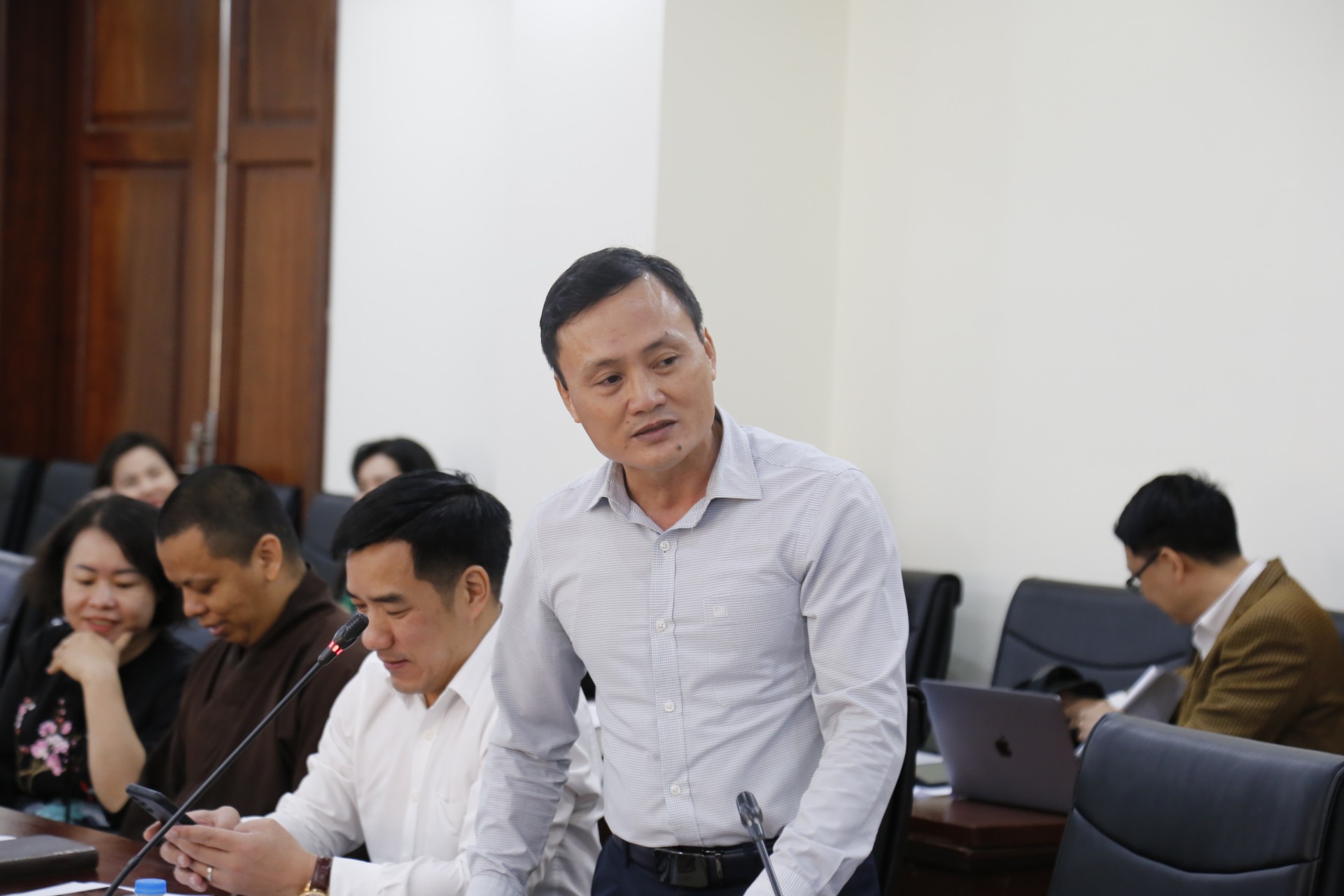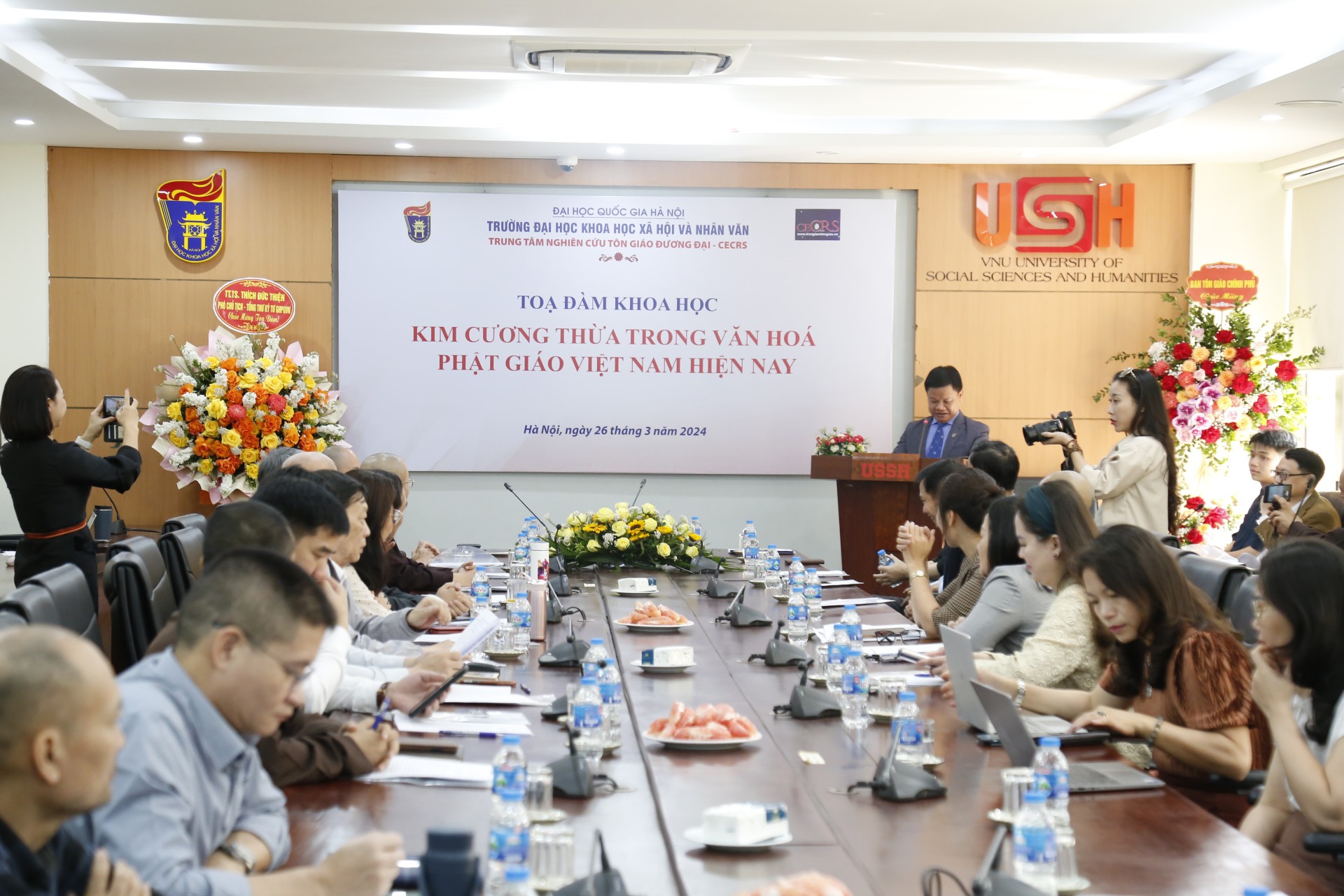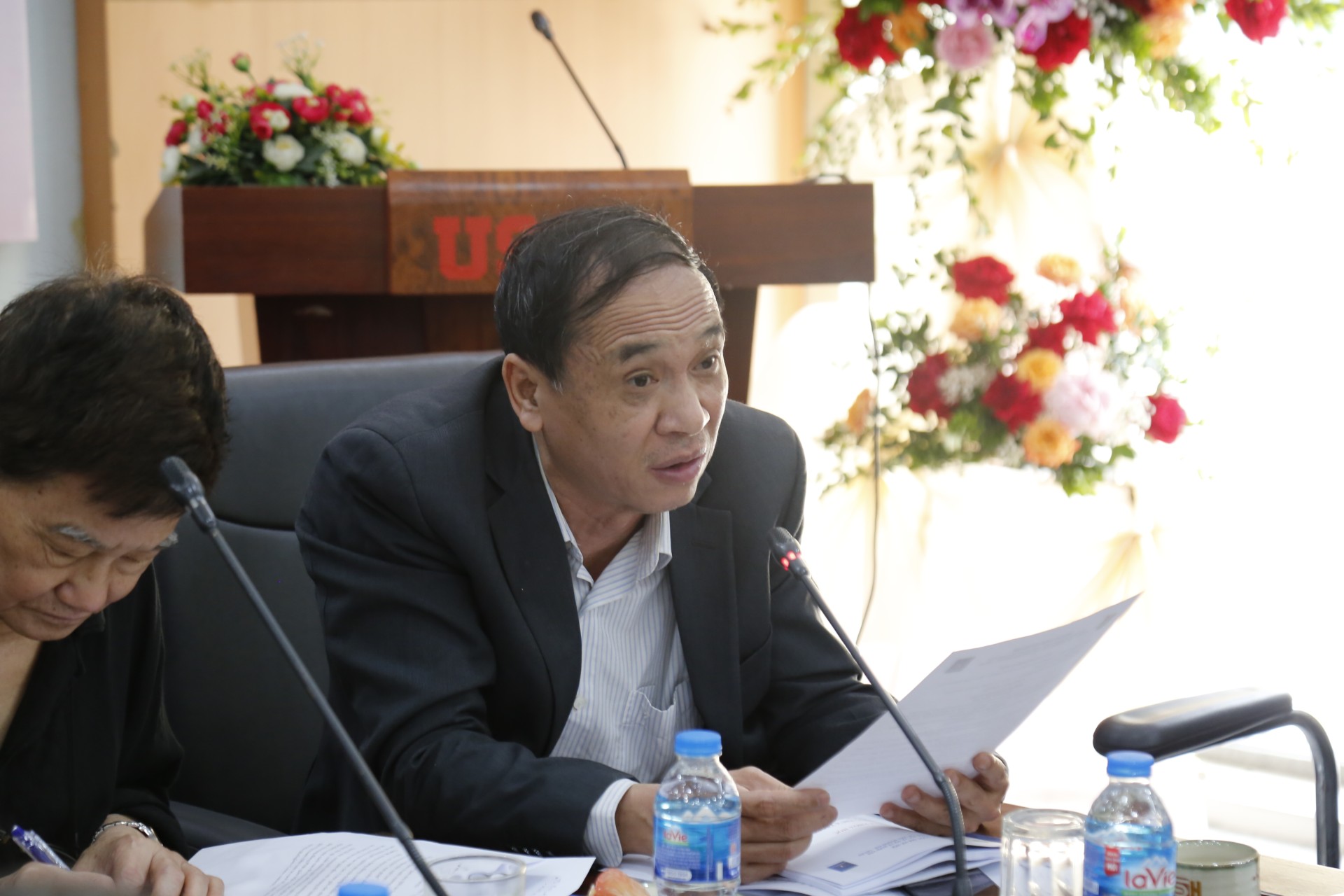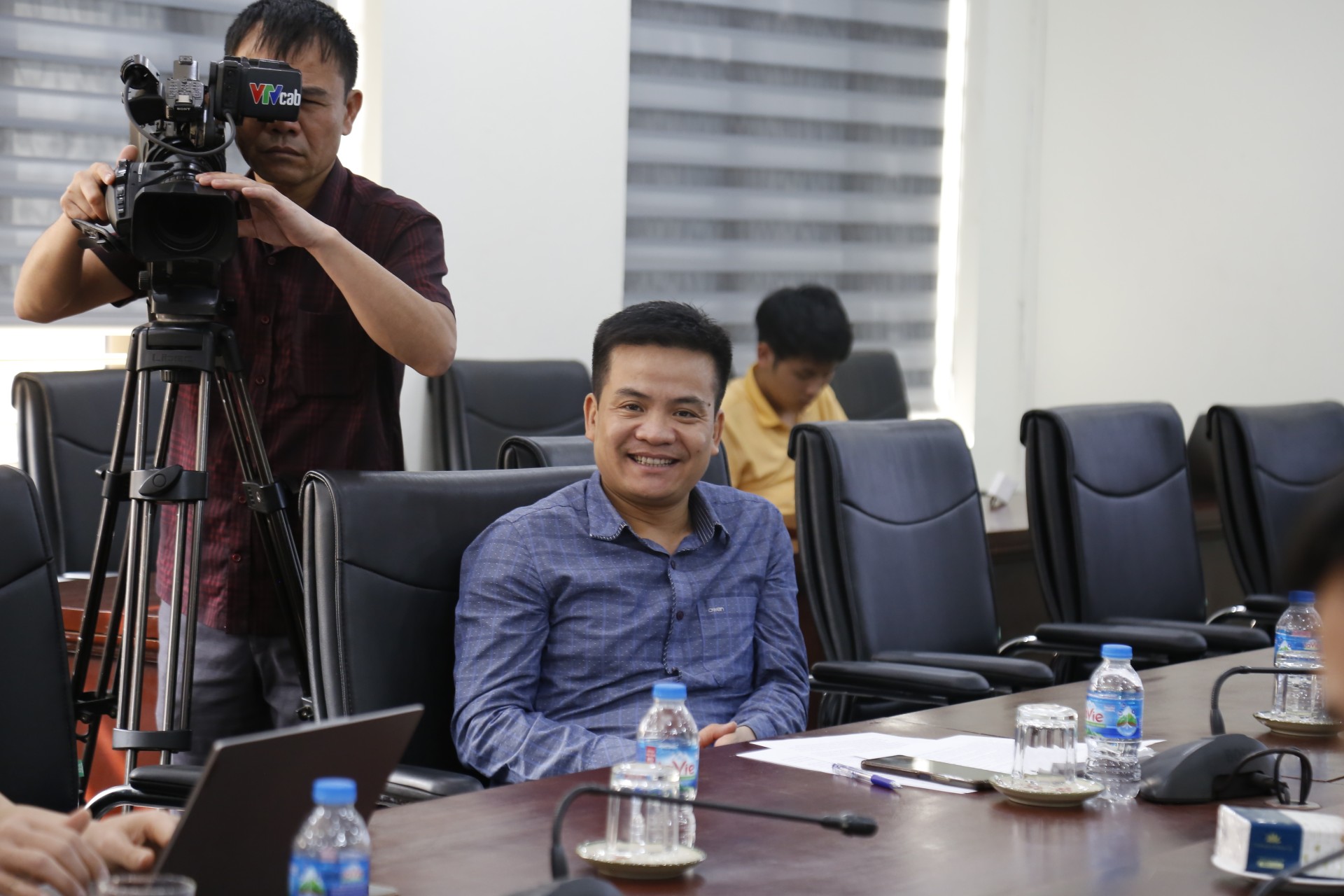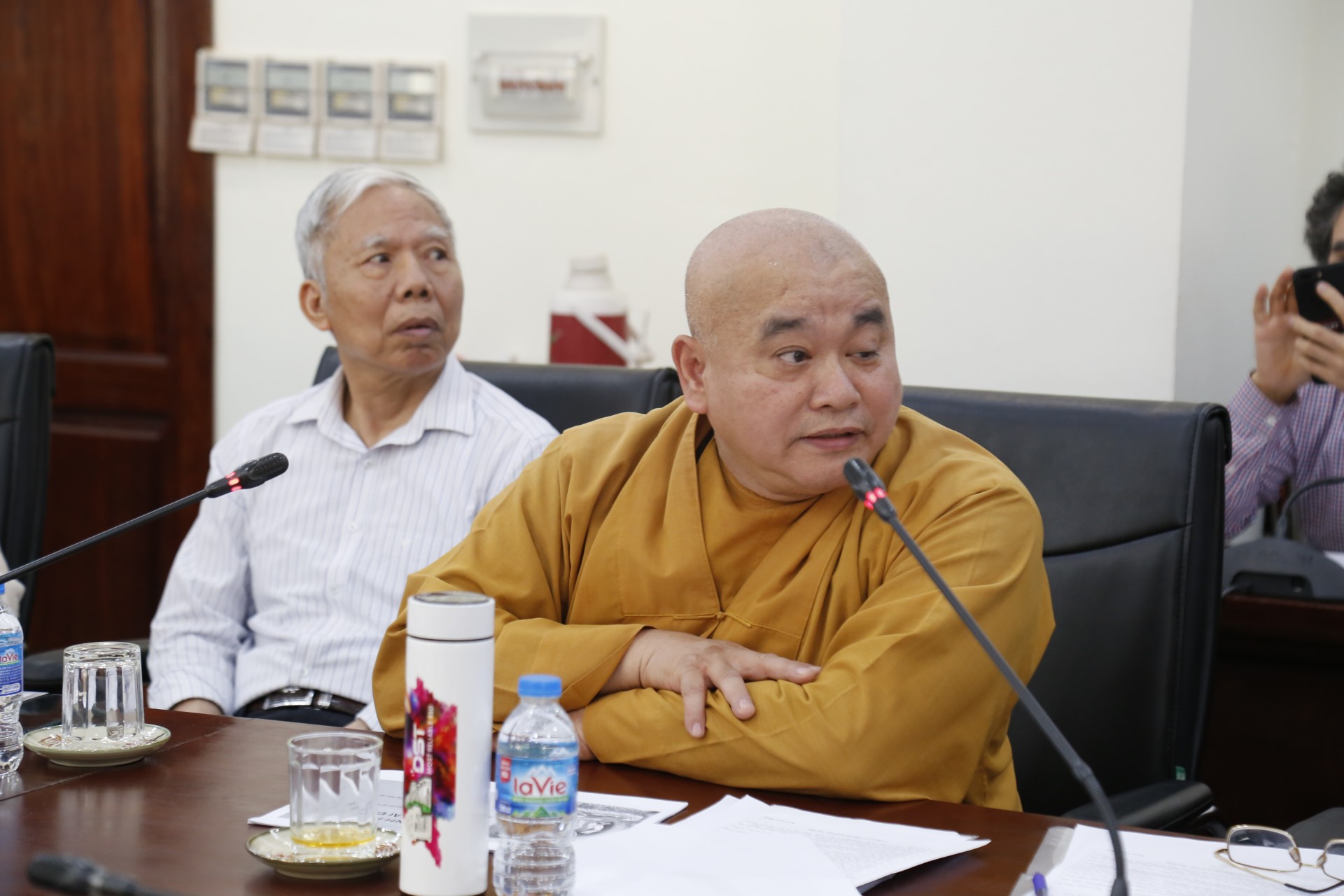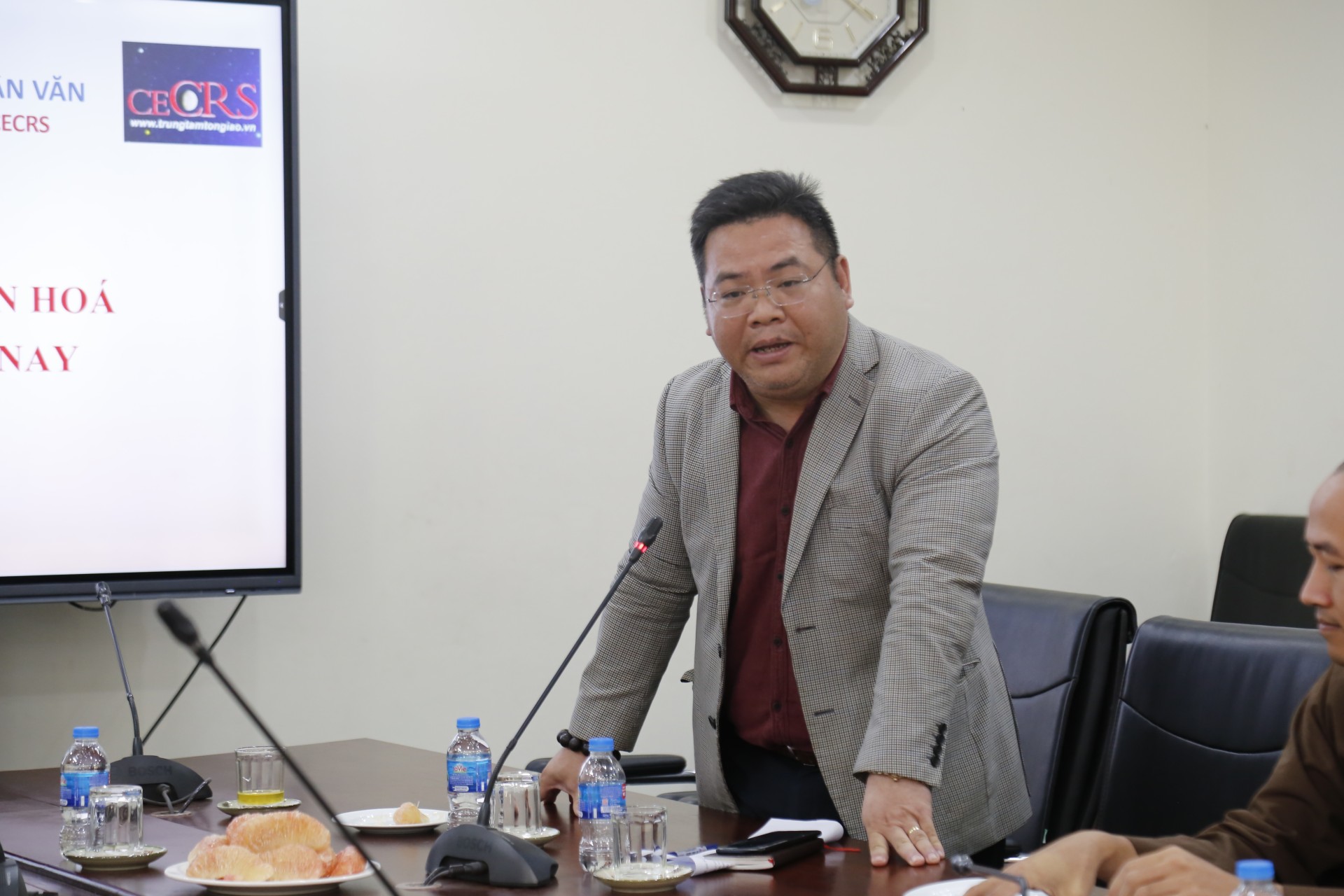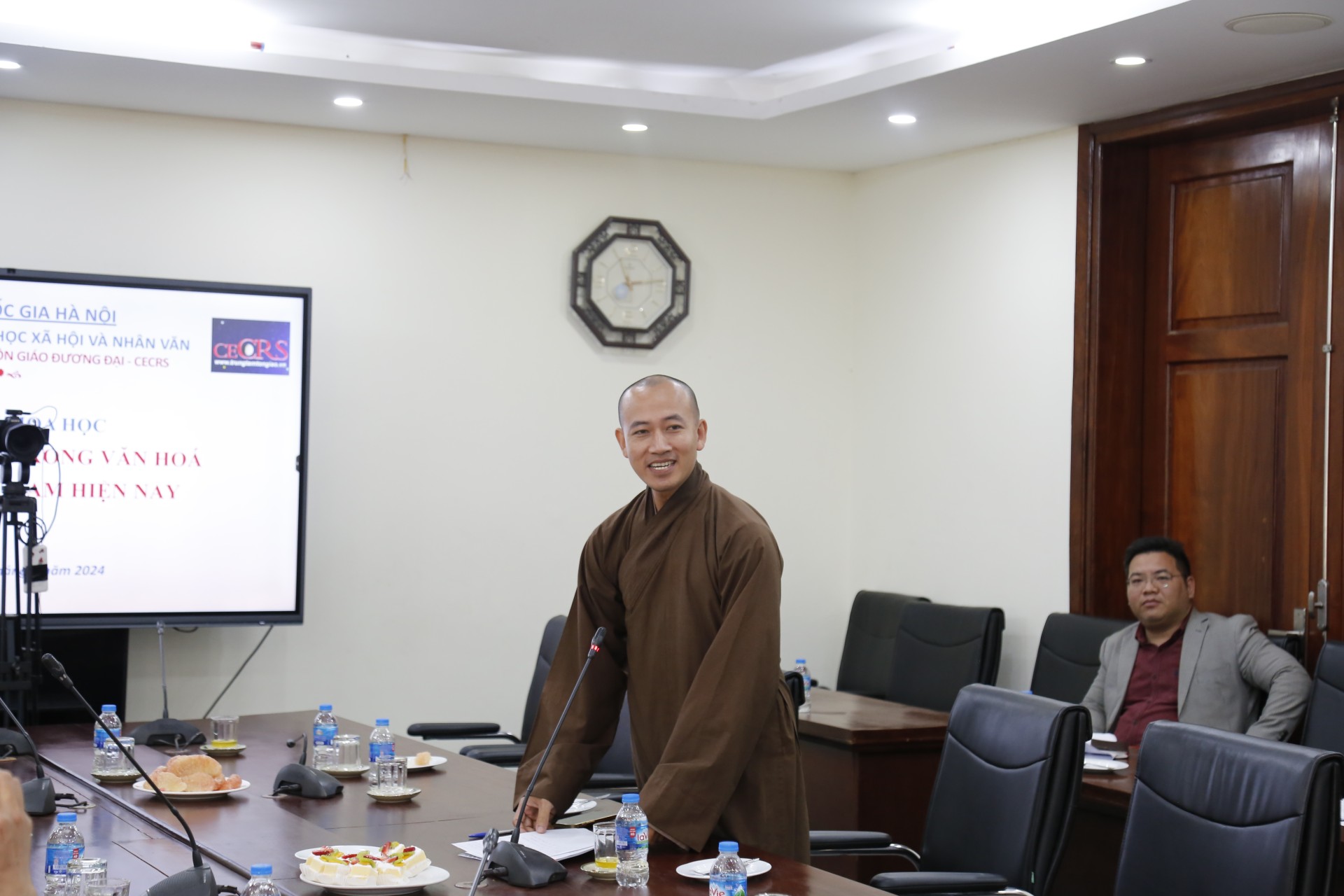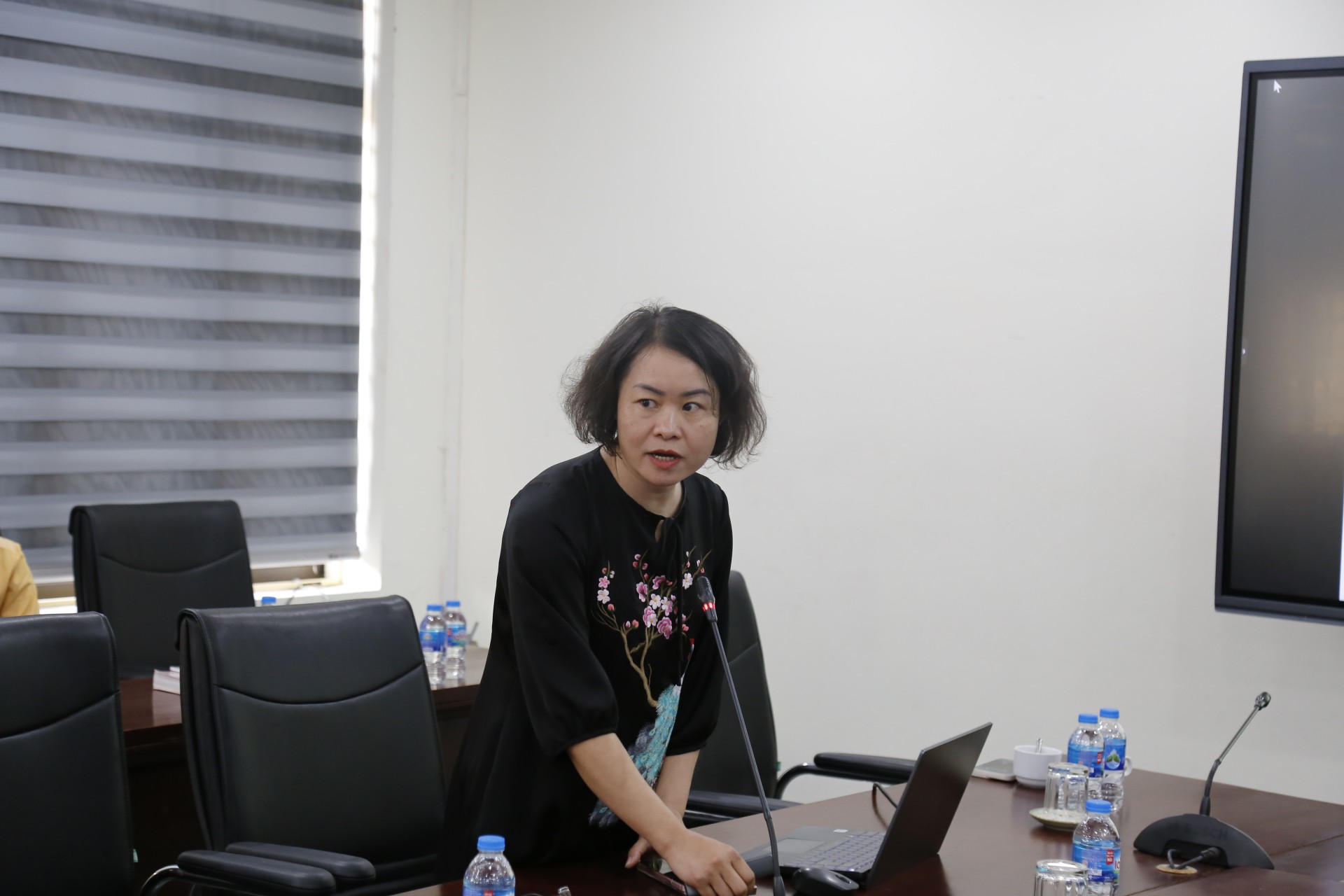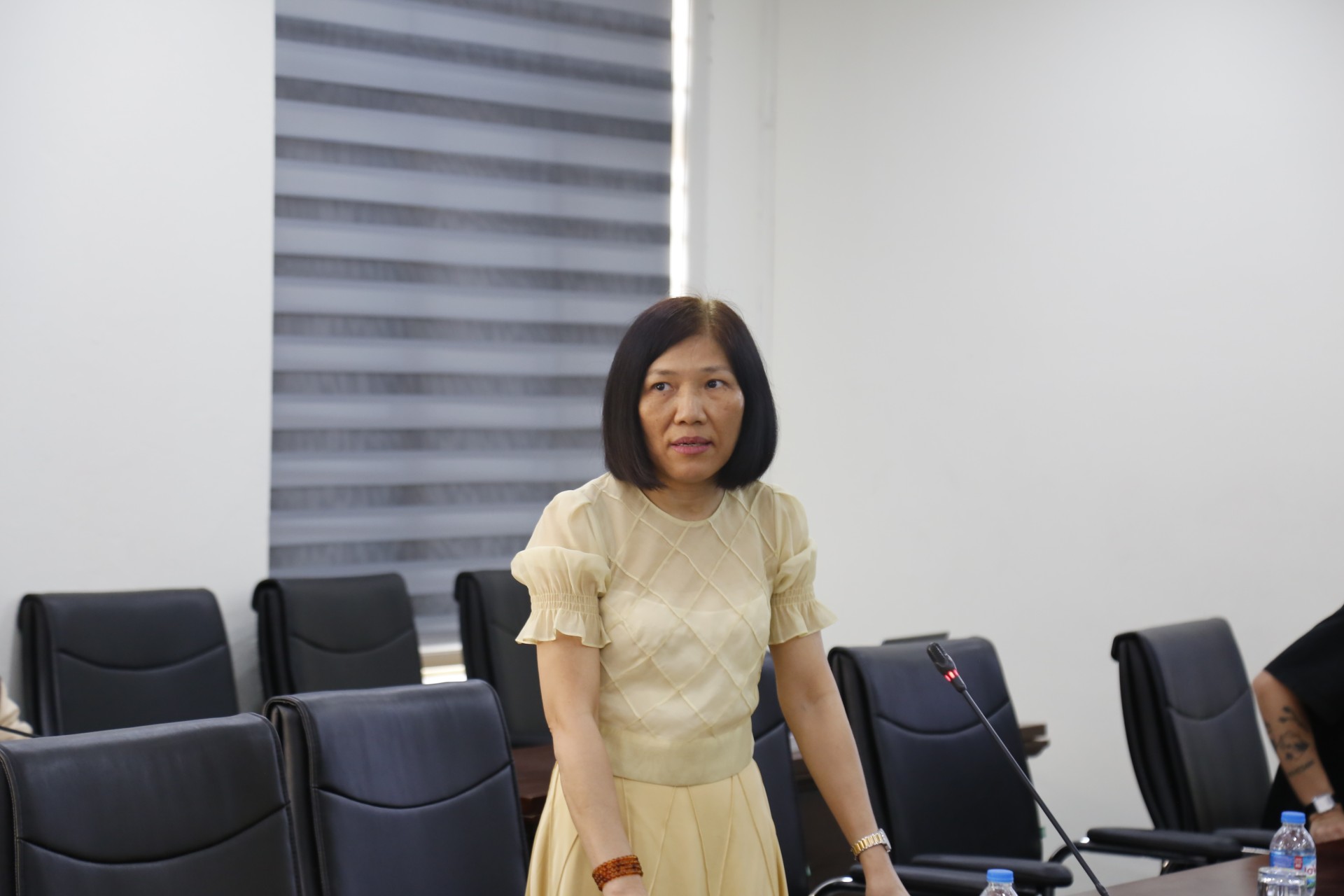The seminar provided some policy recommendations, but further systematic and in-depth research on Vajrayana Buddhism is needed, and the Center for Contemporary Religious Studies should continue to be a pioneering institution.
This was the conclusion reached by scientists at a scientific seminar on the topic "Vajrayana Buddhism in contemporary Vietnamese Buddhist culture." The seminar was organized by the Center for Contemporary Religious Studies, Faculty of Social Sciences and Humanities, Vietnam National University, Hanoi, on the morning of March 26, 2024.
This scientific issue has attracted the attention of many reputable scientists.
Attending the seminar, on behalf of the Vietnam Buddhist Sangha were Venerable Thich Duc Thien, PhD - Vice President, General Secretary, and Head of the International Buddhist Affairs Committee of the Central Committee of the Vietnam Buddhist Sangha; Professor Le Manh That - Vice Rector of the Vietnam Buddhist Academy in Ho Chi Minh City; Venerable Thich Nguyen Dat, PhD - Vice Rector of the Vietnam Buddhist Academy in Hue; Layman Luong Gia Tinh - Vice Rector of the Vietnam Buddhist Academy in Hanoi; and Venerable Thich Van Tri - Head of the Executive Board of the Vietnam Buddhist Sangha in Da Lat City.
Representing domestic management and research institutions were Ms. Tran Thi Minh Nga - Deputy Head of the Government Religious Affairs Committee; Assoc. Prof. Dr. Nguyen Thi Minh Ngoc - Deputy Director of the Institute of Sociology, Vietnam Academy of Social Sciences; Dr. Le Tam Dac - Deputy Director of the Institute of Religion and Beliefs, Ho Chi Minh National Academy of Politics; Dr. Pham Thi Lan Anh - Head of the Cultural Heritage Management Department, Hanoi Department of Culture and Sports; and Dr. Dang Cam Tu - Director of the Center for the Development of Women in North Central Vietnam, Vietnam Women's Union.
Representing Vietnam National University, Hanoi and the University of Social Sciences and Humanities were Assoc. Prof. Dr. Nguyen Hoang Hai - Vice Director of Vietnam National University, Hanoi; Assoc. Prof. Dr. Dao Thanh Truong - Vice Rector of the University of Social Sciences and Humanities; Assoc. Prof. Dr. Lai Quoc Khanh - Vice Rector of the University of Social Sciences and Humanities, Director of the Center for Contemporary Religious Studies; Prof. Dr. Do Quang Hung - Chairman of the Scientific Council and Director of the Center for Contemporary Religious Studies; Dr. Trinh Van Dinh - Head of the Scientific Research Management Department, along with numerous scientists, monks, Buddhists, students, and postgraduate students from within and outside the University of Social Sciences and Humanities.
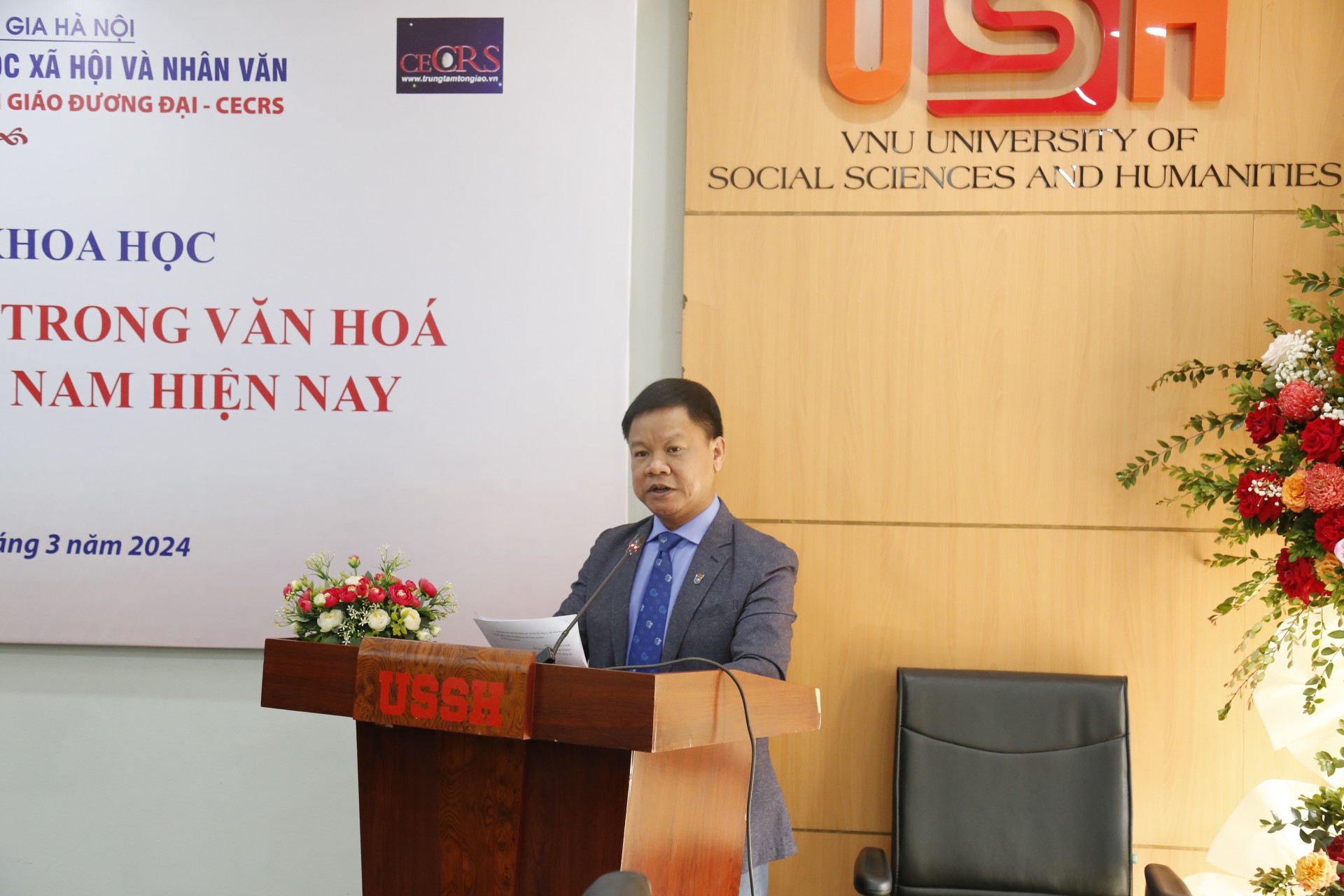
Assoc. Prof. Dr. Lai Quoc Khanh - Vice Rector of the University of Social Sciences and Humanities, Director of the Center for Contemporary Religious Studies
In his opening remarks at the seminar, Associate Professor Dr. Lai Quoc Khanh, Vice Rector of the University of Social Sciences and Humanities and Director of the Center for Contemporary Religious Studies, stated that throughout the historical and cultural development of the Vietnamese nation, Vietnamese Buddhism, along with generations of monks, laypeople, Buddhist followers, and various Buddhist schools and sects, has made immense contributions, with Zen Buddhism, Pure Land Buddhism, and Esoteric Buddhism playing a very important role. Entering the 21st century, the third millennium, Buddhism worldwide, and in Vietnam in particular, with its vast intellectual and cultural heritage and the power of Compassion and Wisdom, is truly a valuable resource for the stability and development of society. However, to fully utilize this resource, thorough and serious scientific research is needed.
It can be affirmed that, among the overall valuable research works on Buddhism, studies on Tantric Buddhism - Vajrayana in Vietnam are not numerous, have not truly met the societal need for understanding, and have not truly provided scientific arguments for the planning of relevant policies by both the State and the Vietnam Buddhist Sangha.
In this context, the scientific seminar: "Vajrayana Buddhism in Contemporary Vietnamese Buddhist Culture" was organized with the hope that it would be a scientific activity to initiate research directions to promote the positive values of Buddhism, including Vajrayana Buddhism, in Vietnam, thereby making practical scientific contributions to meet social needs and policy advice.
Within the framework of the seminar, 12 papers from reputable scientists at the University of Science and Humanities, Vietnam National University, Hanoi, the Vietnam Buddhist Association, and domestic research and policy-making agencies were presented, covering the rich aspects of Vajrayana Buddhism in the historical context of Buddhism in particular and Vietnamese culture in general.
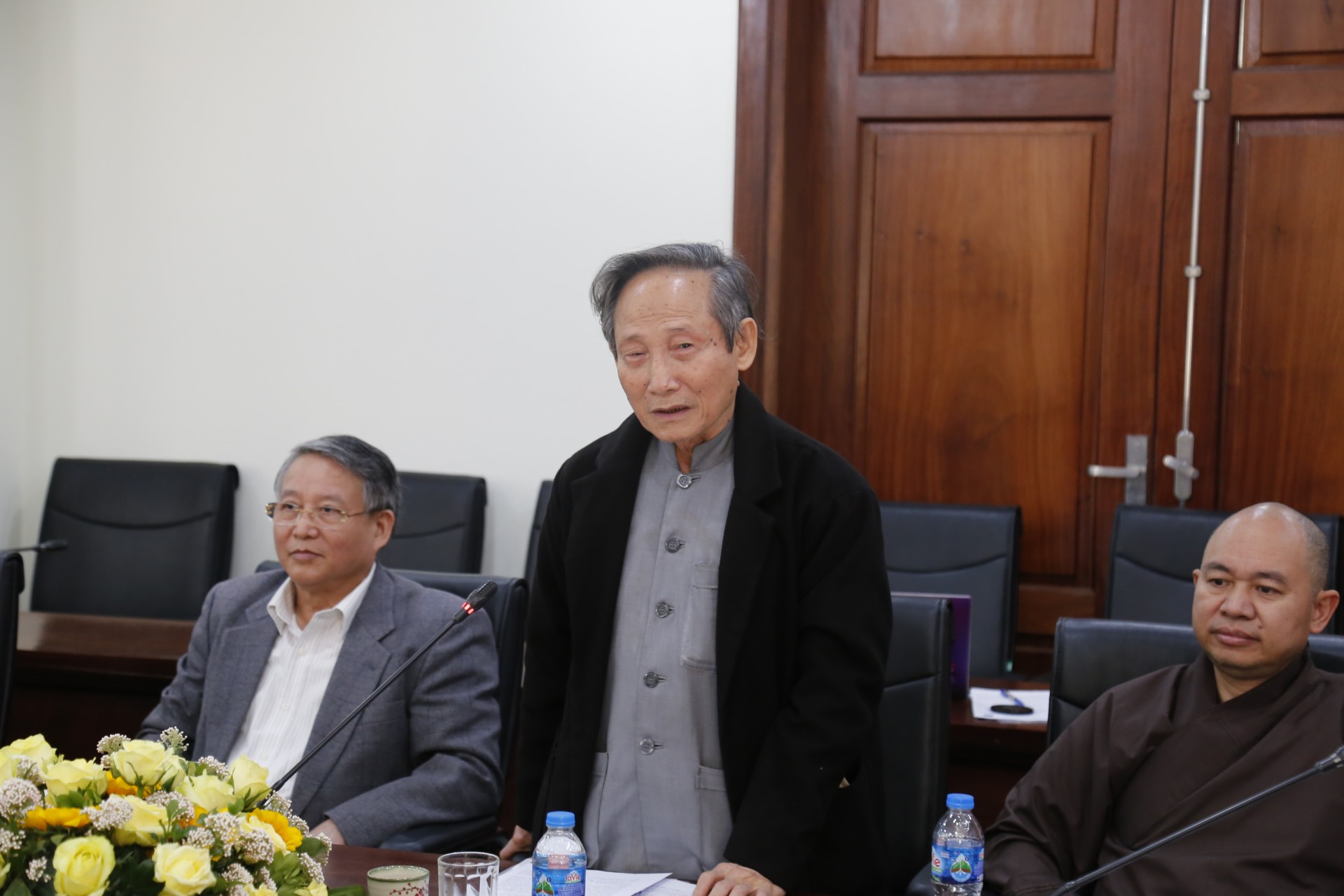
The seminar was honored to have the participation of Professor Le Manh That - Vice Rector of the Vietnam Buddhist Academy in Ho Chi Minh City.
Associate Professor Dr. Nguyen Hoang Hai - Vice Director of Vietnam National University, Hanoi, and Associate Professor Dr. Dao Thanh Truong - Vice Rector of the University of Social Sciences and Humanities, attended the seminar.
Assoc. Prof. Dr. Lai Quoc Khanh, Prof. Dr. Do Quang Hung, and Assoc. Prof. Dr. Nguyen Quang Hung co-chaired the seminar.
The seminar was honored to receive congratulatory flowers from Venerable Thich Duc Thien, PhD - Vice President, General Secretary, Head of the International Buddhist Affairs Committee of the Central Committee of the Vietnam Buddhist Association and the Government's Religious Affairs Committee.
The scientific seminar attracted the attention and contributions of many reputable scientists in the country.
VNU-USSH is a pioneer in researching the scientific aspects of Vajrayana Buddhism.
Tantric Buddhism is one of the schools of Buddhism, originating in India around the 7th century, then spreading to China, Japan, and especially flourishing in Tibet. In Tibet, Tantric Buddhism is also known as Vajrayana. The presence and social influence of Tantric Buddhism - Vajrayana in Vietnam is a reality. The future development trends of Tantric Buddhism - Vajrayana are also a reality that cannot be ignored if we want the genuine values of this Buddhist sect to be preserved and promoted positively.
Professor Do Quang Hung emphasized that the seminar was a rare opportunity to look back at the history and traditions of Vietnamese Tantric Buddhism over thousands of years, which has often existed within the "Zen - Pure Land - Tantric" triangular structure. Many research directions were raised, requiring the study of scientists, such as: what aspects of Vietnamese Tantric Buddhism, including doctrines and practices, need adjustment and improvement in the contemporary world? What is the influence of Tibetan Tantric Buddhism and Vajrayana Buddhism on Vietnamese Buddhism and Buddhist culture today from the perspective of Buddhist studies, Dharma, propagation, and practice? From a socio-economic perspective, what resources does the young Tibetan Tantric community in Vietnam possess to participate in socio-economic development, especially in the demand for cultural and spiritual tourism?
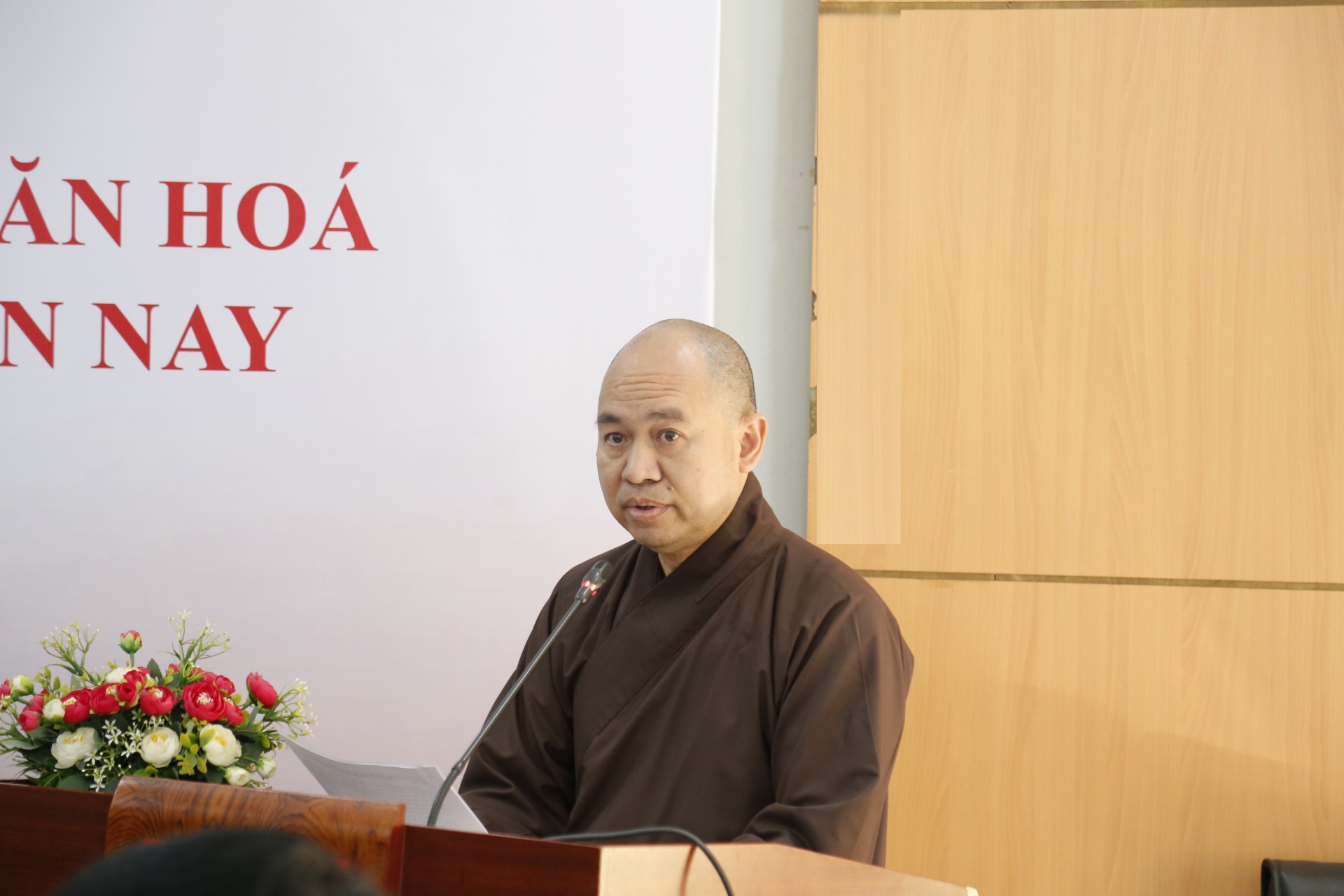
Venerable Thich Duc Thien, PhD - Vice President, General Secretary, and Head of the International Buddhist Affairs Committee of the Central Committee of the Vietnam Buddhist Association, highly appreciated the scientific significance of the seminar.
According to Venerable Thich Duc Thien, Vice President, Secretary General, and Head of the International Buddhist Affairs Committee of the Central Committee of the Vietnam Buddhist Sangha, today, in the context of Vietnam's deep integration into the international community, both regionally and globally, Vietnamese Buddhism also embraces and interacts with many Buddhist traditions and schools, including Zen, Pure Land, and Tantric Buddhism or Vajrayana, from many countries with distinctive traditions of Vajrayana. Vietnamese monks, nuns, and lay Buddhists have practiced according to the methods, rituals, and culture of Vajrayana Buddhism.
In this context, the scientific seminar on Vajrayana Buddhism organized by the Center for Contemporary Religious Studies is extremely necessary to help Vietnamese monks, nuns, and Buddhists better understand and correctly identify the equality of enlightenment and liberation in all Buddhist practices.
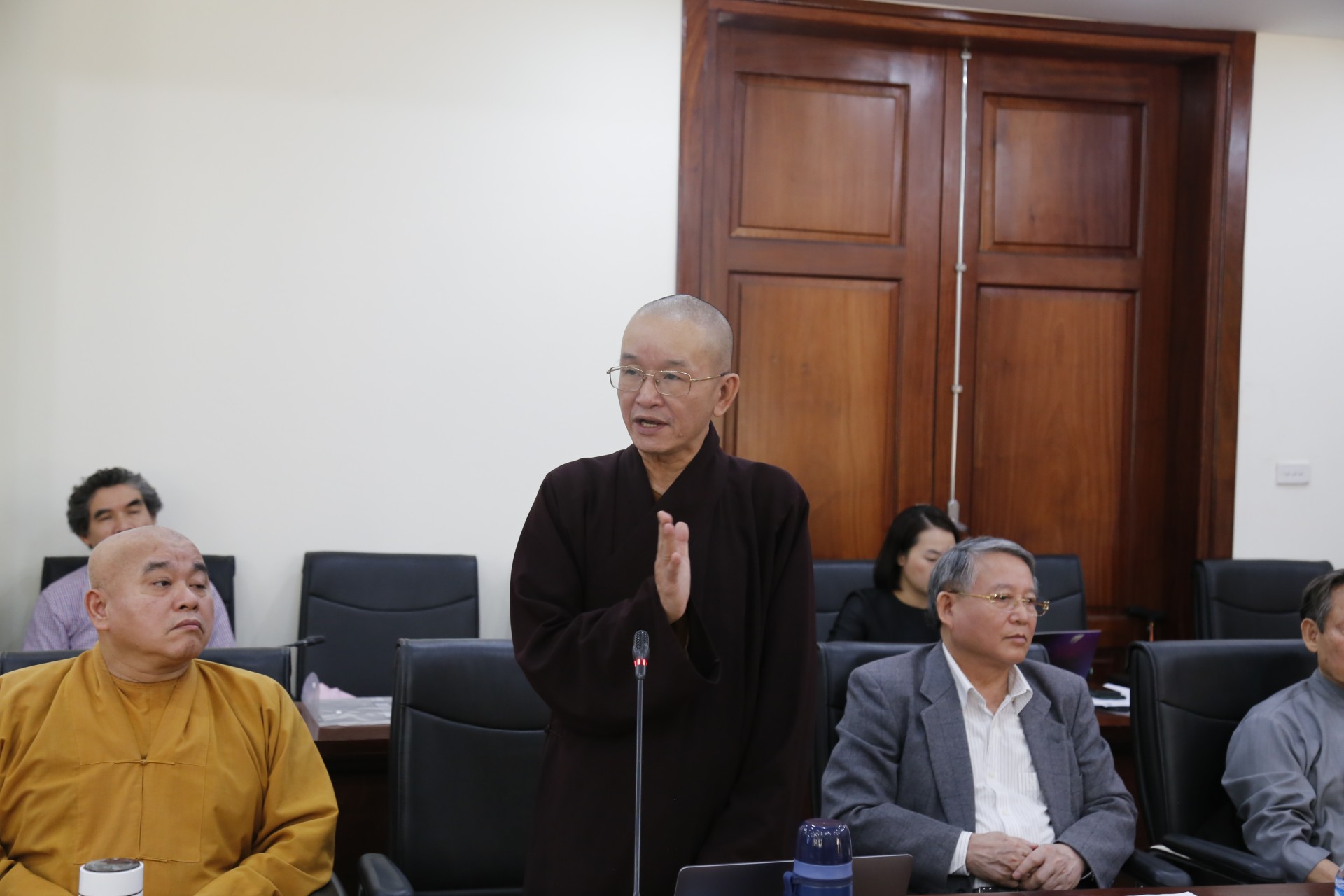
Venerable Thich Nguyen Dat, PhD - Vice Rector of the Vietnam Buddhist Academy in Hue
Layman Luong Gia Tinh - Vice Rector of the Vietnam Buddhist Academy in Hanoi
Venerable Thich Van Tri - Head of the Executive Board of the Buddhist Association in Da Lat City
Dr. Le Tam Dac - Deputy Director of the Institute of Religion and Beliefs, Ho Chi Minh National Academy of Politics
With diverse perspectives on the historical formation and development, and the aspects of identifying and developing the positive aspects of Vajrayana Buddhism in Vietnamese culture, the scientists brought to the seminar an atmosphere of serious and open scientific exchange, inspiring many new research directions. The topics discussed at the seminar included: “Vajrayana Buddhism in Vietnam: Past and Present” (Prof. Le Manh That - Vice Rector of the Vietnam Buddhist Academy in Ho Chi Minh City); “Esoteric Buddhism in the Spiritual Life of Vietnamese People Today” (Assoc. Prof. Dr. Nguyen Minh Ngoc (Vice Rector of the Institute of Sociology, Vietnam Academy of Social Sciences); “Vajrayana Buddhism in the Vietnamese Cultural Stream” (Assoc. Prof. Dr. Lai Quoc Khanh – Vice Rector of the University of Social Sciences and Humanities, Director of the Center for Research and Development of Esoteric Buddhism; Venerable Dr. Thich Nguyen Dat - Vice Rector of the Vietnam Buddhist Academy in Hue); “Vajrayana Buddhism in the Life of Vietnamese Buddhism Today” (Layman Luong Gia Tinh - Vice Rector of the Vietnam Buddhist Academy in Hanoi); “A Perspective from the Influence of Esoteric Buddhism in Taiwan on the Development of Esoteric Buddhism in Vietnam” (Venerable Dr. Thich Giai Hien - Vietnam Buddhist Academy in Hue); “Esoteric Buddhism in the Flow of Vietnamese Buddhism” (Dr. Bui Huu Duoc - Institute of Esoteric Buddhism) "Religion, beliefs, Vietnam National Academy of Buddhism"; "Basic Identification of the Manifestations and Nature of the Great Compassion Dharani - A Mantra Widely Practiced in Contemporary Vietnamese Buddhist Culture" (Dr. Mai Thi Thom - Tran Nhan Tong Institute, Vietnam National University, Hanoi); "The Imprint of Vajrayana Buddhism at Temples in Hanoi" (Dr. Pham Thi Lan Anh - Head of Cultural Heritage Management Department, Hanoi Department of Culture and Sports); "Buddhism and Culture (from the perspective of international scholars to Vietnamese Vajrayana Buddhism)" by Assoc. Prof. Dr. Nguyen Quang Hung - Vice Chairman of the Scientific Council of the Center for Research and Development of Buddhist Studies; "From Zen Master Minh Chau Huong Hai to Zen Master Thich Dai San and the Element of Power in Thuan Quang Culture in the 17th - 18th Centuries" (Dr. Thich Chan Dao - Vietnam Buddhist Academy in Hue); "Vajrayana Buddhism in World and Vietnamese Buddhist Culture" (Dr. Vu Van Chung (University of Social Sciences and Humanities)).
Scientists attending the seminar assessed that, as a leading university in social sciences and humanities research, the University of Social Sciences and Humanities, Vietnam National University, Hanoi, has been open and innovative in organizing a seminar bringing together pioneering scientific research on Vajrayana Buddhism in Vietnam, on par with major universities around the world.
With meticulous, serious, and highly professional preparation, and with the support and participation of reputable researchers, the seminar provided new and valuable scientific arguments, thereby contributing to clarifying the position, role, and unique values of Tantric Buddhism - Vajrayana in Vietnamese cultural life in general, and Vietnamese Buddhist culture in particular. This contributes to deepening and enriching Vietnamese Buddhism, promoting the values and resources of Buddhism in particular and religion in general in the construction and modernization of a strong and prosperous Vietnam.
Here are some images from the scientific seminar "Vajrayana Buddhism in contemporary Vietnamese Buddhist culture" held on the morning of March 26, 2024:


